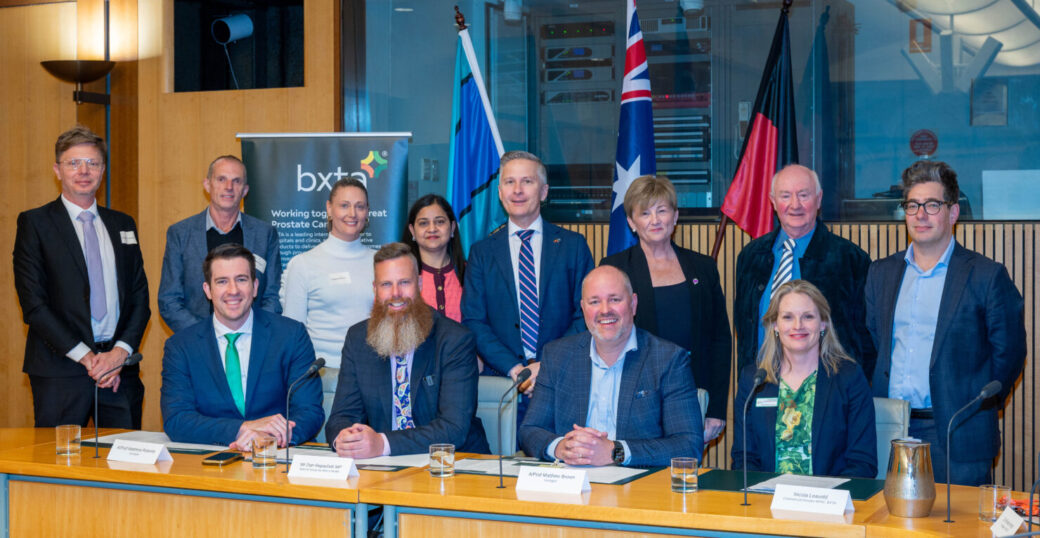Advancing Prostate Cancer Diagnosis: BXTA and Australian Government Unite to Drive Men’s Health Innovation

Back row: Emanuele Costanza – Specialist Urology Nurse, David Heath – Urology Oncology Nurse Practitioner, Evie Mertens – Urology Nurse Practitioner, Dr Divya Srivastava – Director Anatomical Pathology, Dr Michael Wright – President, RACGP, Belinda Barnier – Senior Community Relationship Manager, Rise Above, Dr Chris Harrison – Specialist General Practitioner, Dr Daniel Gilbourd – Urologist
Front row: A/Prof Matthew Roberts – Urologist, The Hon Dan Repacholi MP – Special Envoy for Men’s Health, A/Prof Matthew Brown – Urologist, Nicola Leavold – Commercial Director, APAC, BXTA
This week, BXTA was proud to stand alongside leading voices in men’s health, supporting initiatives that aim to reshape prostate cancer diagnosis and outcomes across Australia.
The national roundtable was held at Parliament house. Gathered around the table were clinicians, policymakers, and advocates—including the Special Envoy for Men’s Health, Mr Dan Repacholi, MP, and facilitators Associate Professor Matt Brown and Associate Professor Matt Roberts. Their collective expertise and dedication served as a powerful reminder of what can be achieved when the medical community comes together with shared purpose.
During his remarks, The Hon Dan Repacholi MP, Federal Member for Hunter in New South Wales and Special Envoy for Men’s Health, shared a simple but powerful message: “Talking about men’s health saves lives.” He further drew attention to the scale of the challenge, stating: “Prostate cancer is the most diagnosed cancer for Aussie blokes. Each year, 3,500 men die from it. That’s 3,500 fathers, brothers, mates, uncles.” His words captured the heart of the discussion—emphasising that breaking stigma, encouraging open conversations, and supporting early detection can change the future of prostate cancer in Australia.
Nicola Leavold, BXTA’s Commercial Director, opened the session with a compelling call for innovation. With approximately 28,000 Australian men projected to be diagnosed with prostate cancer in 2025—around 79 every day—she underscored the urgent need to improve diagnostic access and efficiency. Alarmingly, nearly half of those diagnosed will be of working age, amplifying the disease’s social and economic impact. Leavold highlighted the emerging role of local anaesthetic transperineal biopsies as a transformative solution—offering faster diagnosis, improved patient experience, and substantial cost savings for the public health system3.
The message was clear: early detection saves lives. Patients with prostate cancer have a 98% survival rate when caught early, yet just 36% of cases are diagnosed at this stage. Because early prostate cancer often progresses silently, improving pathways to timely diagnosis is essential to giving men the best chance at recovery. A recurring theme throughout the discussion was the pressing need to transform current practices. As was emphasized, “We can’t sustain it by working harder… We’ve got to work smarter.” This insight underlines the importance of innovative approaches, such as local anaesthetic transperineal biopsies, to improve prostate cancer diagnosis while ensuring healthcare sustainability.
We’re committed to supporting evidence-based innovation that improves health outcomes nationwide. Collaboration is the cornerstone of that mission—by bringing together diverse perspectives, sharing data, and investing in smarter diagnostic methods, we can move closer to a future where every man has access to accurate and efficient prostate cancer care.
We thank all participants for their invaluable contributions and look forward to continuing this shared journey toward better men’s health.
References
- https://www.prostate.org.au/risk-and-symptoms/facts-figures/
- BJUI study by A/Prof Matt Roberts
- Transperineal prostate biopsy under local vs general aneathesia: a cost-effective analysis. Matthew J. Roberts, Shiksha Arora, Henry H. Yao, Donnacha Hogan, Brendadn Dias, Helen E. O’Connell, David Wetherell, Homayoun Zargar, Michael Kwok, Stephen P. McGeorge, Adam Pearce, John Yaxley, and Haitham Tuffaha. BJUI 2025